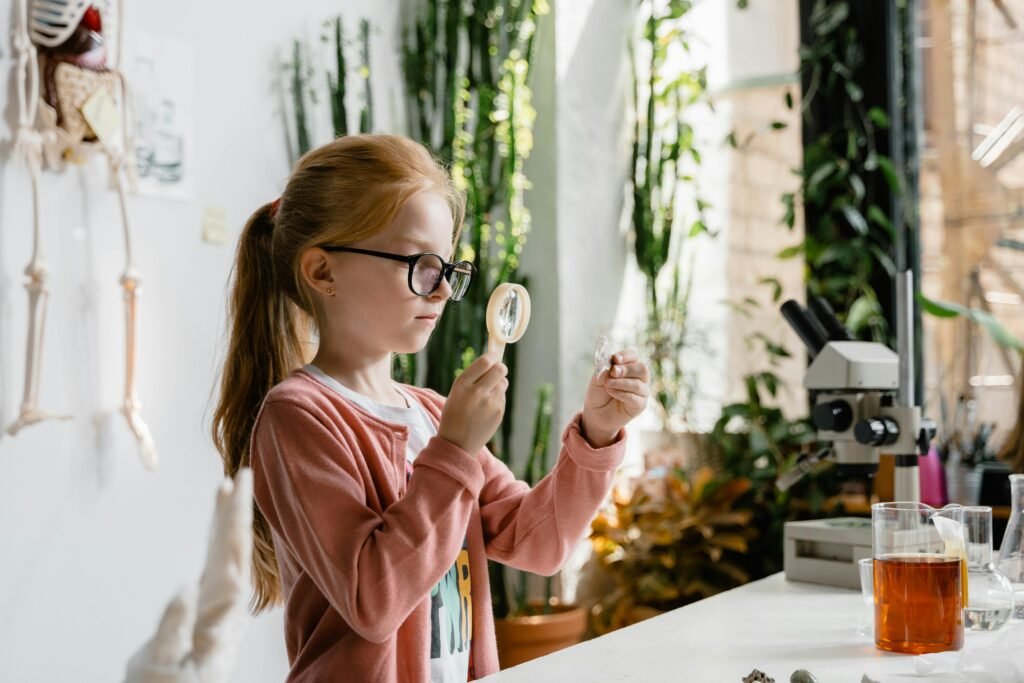
Differentiation in high school biology customizes teaching methods and materials to meet gifted learners’ unique needs, using strategies like pretesting, higher-level questioning, and Depth & Complexity, which enhances engagement, critical thinking, and deeper understanding while maintaining pace and challenge appropriate for advanced students.
Ever felt like some lessons just don’t fit your brain? Differentiation in high school biology is all about tweaking how subjects are taught so gifted students get challenged without boredom. Curious how that looks in a real class? Let’s dive into ways advanced kids can skip, soar, and dig deeper — while everyone else keeps up comfortably.
Pretesting and high-level resources for advanced learners
Pretesting lets you figure out what students already know before diving in. This approach saves time and keeps gifted learners engaged—because, honestly, who likes going over stuff they already get?
Think of pretesting like a map; it shows where to focus and where to speed up. It’s not just about skipping—it’s about pushing higher.
- Use short quizzes or quick questions that tap into higher-level thinking.
- Offer advanced reading or videos for those who pass early checks.
- Let students explore complex topics or take on mini research projects.
You may ask, “Is pretesting stressful?” Not if you keep it low stakes. The goal is clarity, not grading.
High-level resources are like stepping stones that challenge your brain without drowning it.
- Provide access to college-level textbooks or documentaries for deeper understanding.
- Include interactive tools like simulations to explore biology concepts practically.
- Encourage asking “what if” questions to spark curiosity and critical thinking.
According to the National Association for Gifted Children, properly challenging materials boost motivation and learning outcomes.
It’s like giving your brain a workout it actually enjoys.
Strengthening questions and integrating critical thinking
Strengthening questions means pushing beyond basic facts and encouraging deeper thinking. You know, it’s like upgrading the usual quiz to a brain workout.
Instead of asking “What is cell mitosis?”, try “How might mitosis affect growth in different organisms?” It’s subtle but powerful.
- Start with recall questions, but quickly add analysis or “why” prompts.
- Encourage students to explain concepts in their own words — trust me, it makes a difference.
- Use “what if” scenarios to spark imagination and real-world connections.
Now, critical thinking isn’t just a fancy term. It’s the skill that helps students solve problems and see patterns.
Here’s the thing — you can’t just tell someone to think critically. You need to create moments that challenge their assumptions.
- Present a puzzling biology case study, like genetic mutations that defy expected outcomes.
- Ask students to debate different explanations and back up their views.
- Invite them to design experiments or predict results based on evidence.
Research shows that engaging critical thinking boosts retention and sparks curiosity — kind of like giving your brain a bubble bath.
Applying Depth & Complexity for meaningful engagement
Applying Depth & Complexity means helping students explore topics beyond surface facts. It’s like turning a simple puzzle into a whole adventure.
You know, digging deeper isn’t just for fun — it builds real understanding that sticks.
- Depth encourages looking at details, relationships, and underlying patterns.
- Complexity involves examining multiple perspectives, contradictions, or change over time.
- Use icons or prompts that challenge gifted learners to analyze and connect ideas.
Try questions like, “How does this biological process compare across species?” or “What if environmental factors changed suddenly?”
I thought—wait, maybe this is just science fiction, but nope, it’s real-world learning.
- Have students create mind maps linking concepts to bigger themes.
- Encourage research beyond textbooks, like scientific journals or documentaries.
- Introduce debates over controversial biology topics to spark critical thinking.
According to the College Board, students who engage with Depth & Complexity develop stronger problem-solving skills and creativity.
Wrapping up
Differentiation in learning, especially in subjects like biology, is all about meeting students where they are and helping them stretch in ways that feel just right. It’s not about rushing or skipping; it’s about adding layers that make lessons richer and more meaningful.
Using strategies like pretesting, asking stronger questions, and bringing in Depth & Complexity can turn any class into a space where curious minds thrive. It’s like giving your brain a chance to do some deep breathing and a little dance at the same time.
Hey, it’s okay to not have all the answers right now — just try one small step in your learning or teaching journey and see how it feels. Sometimes, that’s all you need to get rolling.
FAQ — your questions about differentiation in high school biology answered
What is differentiation in biology classes?
It means adjusting lessons to meet students’ different learning needs and abilities, especially for gifted learners.
How can pretesting help gifted students?
Pretesting shows what students already know, so teachers can tailor activities and avoid repeating familiar material.
Can stronger questions really improve student learning?
Yes, asking deeper, thought-provoking questions encourages critical thinking and better understanding.
Is Depth & Complexity useful for all students?
While mainly for advanced learners, it can inspire curiosity and richer learning for many students.
Should teachers use special resources for gifted learners?
Providing high-level resources often boosts motivation and helps gifted students stay challenged.
How can students practice critical thinking at home?
They can explore real-world science questions, debate ideas, or design simple experiments to test hypotheses.

A certified Heal Your Life® Coach with 20+ years in education and emotional development. Supports gifted teens in navigating anxiety, perfectionism, and identity challenges, while equipping parents with practical tools for lasting transformation. Sessions blend emotional healing, mindset mastery, and strategic empowerment.



